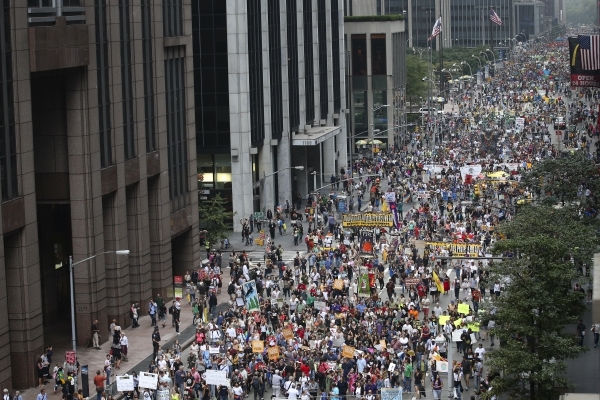ATHENS — The People's Climate March on Sept. 21 was a great success, not only in terms of the amazing number of participants, but also by demonstrating the climate movement's multi-racial, class-diverse, and intergenerational potential.
This is important. Climate change is the paramount issue we have to resolve - if we don't, there won't be any other issues for us to worry about.
But it's also the one that, at the same time, must include the other issues we face - peace, social and economic justice, citizen-based democracy, and an everyday values transformation - as a necessary condition for its own successful resolution.
If that moment of magnificent community is to live over time, it will be because we translate the life-affirmative energy that was loose in the streets of Manhattan that Sunday into intentional everyday efforts to successfully transition to a sane, post-oil world.
* * *
What is to be done?
On the one hand, we need to become an increasingly resilient, community-sufficient people who can adapt to the climate change that is already here, climate change that will become increasingly part of our lives in the years ahead no matter what we do now.
We can't avoid the consequences of the melting of the Arctic ice, the collapse of Antarctic ice sheets, the acidification of our oceans, the release of methane gas, and the phenomena of climate lag, not to mention nature's capacity for exponential, non-linear, tipping-point development. We've waited too long. Climate change is no longer just an issue for our grandchildren. It's something that we have to learn to live with now.
On the other hand, we must also become part of the growing international citizen's movement to create the political will to leave the oil in the soil, the gas under the grass, and the coal in the hole.
Otherwise, our efforts to build sustainable communities will go for naught.
The greed inherent to capitalism that values profit over people has now reached its inevitable endgame with climate change. Given that we can't afford to burn the stuff anymore, we face the ultimate question.
Will we, the people, allow those special interests that want to extract the last drop of oil for their own financial interests to push us over the cliff of no return? Or will we reclaim our power as living beings and assert our natural right to simply live?
Whatever we do begins by talking with one another, bringing climate change out of the closet, and making it part of our everyday interactions.
We need to have community conversations in our homes, schools, and churches, in our workplaces, organizations, and local government, to discuss what climate change means to us and how we can anticipate its effects on our lives.
We need to discuss what we can do both to live with climate change, skillfully and wholesomely, as well as to mitigate its advance.
As important as action is, conversation is the necessary prelude to the steps we then take. For talking involves a level of acknowledgment that doesn't exist before what is said is spoken out loud. By breaking the silence, and treating climate change for the critical reality that it is, we're no longer stuck at square one. We're moving forward.
* * *
We need to engage our Selectboards - not to make them responsible for solving the mess we're in, because that responsibility falls to all us, but to encourage their leadership through the simple act of acknowledging the importance of climate change and the need for us to do what we can to be as prepared as we can be.
Perhaps individual towns can engage by appointing respective citizens' climate committees. In each town, this body would examine what climate change will mean for our local businesses, public services, police and fire departments, education, food and water security, health and wellness, and transportation and energy.
The committee would then make periodic reports and recommendations to the town and Selectboard. At the same time, it would help promote a culture that encourages the entire community to be involved in the effort to be the resilient, collaborative, and socially just people we must be to live successfully in a world of climate change.
This kind of civic enterprise can succeed, however, only through the active leadership of those in positions of leadership.
* * *
We also must talk with our neighbors with the intention of exploring what we can do together to help care for one another. Discussions of this kind will hopefully result in collective actions.
These actions could take the form of organizing a neighborhood mutual aid group for the next Irene, growing a neighborhood garden, or discovering the ways we can help and share with one another - right now.
Through shared activity and common purpose, we begin to learn what it means to be a true community, to work through the challenges of such an undertaking, and to discover its rewards.
While we encourage and celebrate the individual actions that people take to reduce their carbon footprint, we also recognize that the real effort that must be undertaken is collective in nature.
In a culture that has long worshipped individualism, learning to work together is challenging for Americans. Self-sufficiency alone won't do the job if it is not integrated into a larger effort of community-sufficiency.
Only by coming together as families, neighborhoods, communities, towns, regions, and as a nation can we hope to successfully adapt to climate change, as well as to make the necessary systemic changes that will allow us to transition away from fossil fuels to a more sustainable future.
